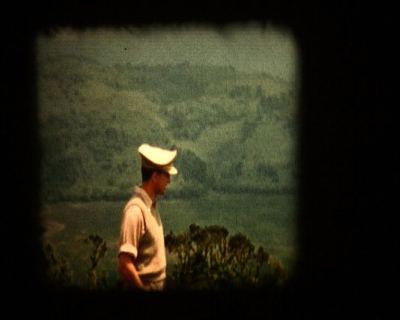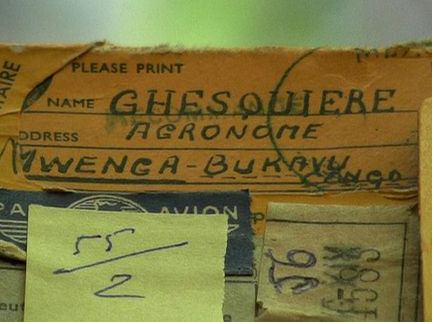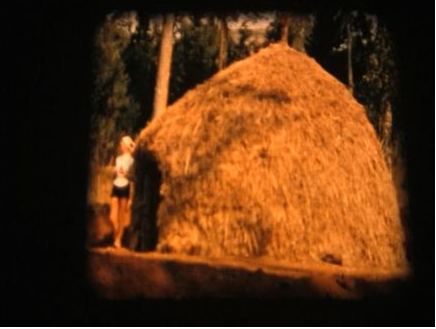Default network cognition:
It’s an
interconnected and anatomically
defined brain system that preferentially activates when individuals
focus on internal tasks such as daydreaming, envisioning the future,
retrieving memories, and gauging others’ perspectives….Its subsystems
include part of the medial temporal lobe for memory, part of the medial
prefrontal cortex for mental simulations, and the posterior cingulate
cortex for integration, along with the adjacent precuneus and the
medial, lateral and inferior parietal cortex….The default network has
been hypothesized to generate spontaneous thoughts during mind-wandering
and believed to be an essential component of creativity. (more)

Vancouver
B.C.’s Isabelle
Pauwels is the first winner of the Brink
Award. Administered by the Henry Gallery, the Brink was conceived and funded by Seattle collectors/art
patrons
John and Shari Behnke. It’s intended to offer encouragement to a Northwest artist who might be poised at the beginning of a substantial career. Besides the honor of it all, winners get $12,5000 and a solo exhibition at the Henry. Pauwels’ installation is now on view and titled, Incredibly, unbelievably/ The complete ordered field.
The title itself is unbelievable. If hers is an ordered field, chaos has competition. Her work appears tossed off – notebook entries, not novels. Instead of dipping into her subject matter – reality TV, talk shows, candid snapshots, family films and cultural documentaries – she lets it flow around her. Should she fashion a figure, it will have no spine. The viewer who is looking for a narrative thread can find it, but probably not without cue cards, otherwise known as background information.

Pauwels:
My
work attempts to interrupt the audience’s familiar reading of a genre in
order to alter its expectations of what content should do, and what its
reaction should be.
Born in Belgium herself, Pauwels’ grandparents were part of the last generation of that country’s colonials.
A little history:
Belgium itself had only been independent since 1830, prior to that it was part of the United Kingdom of the Netherlands. By the time independent Belgium might have been in a position to consider an overseas empire, major imperial powers
already had the most economically promising territories for colonisation within their spheres of influence. Leopold II tried to interest his government in establishing colonies but it lacked the resources to develop the candidate territories and turned down his plans.
Leopold II exploited the Congo for its natural rubber which was starting to become a valuable commodity. His regime in the Congo operated as a forced labour colony, with murder and mutilation as punishment for villagers who did not collect and supply the rubber quota they were given. It is estimated that millions of Congolese died during this time, although many of these could be attributed to the introduction of new diseases. (more)
History, of course, is that nightmare from which Stephen Dedalus is unable to awake. Joseph Beuys confronted his Nazi past with personal myth. Unlike Beuys, Pauwels was not a direct participant in a time notable for its horror. Neither were her grandparents. They were post Leopold II – paternalists, not murderers. They existed in a still poisonous aftermath, and she was born long after that. If she doesn’t bring it up her connection to the colonial past, nobody else will.
Her touch is so light, her subject is barely there. The gallery includes notes and fragments of notes, a grass hut with a flickering film inside, another stuttering film and other detritus. She can be unexpectedly funny. A series of postcards framed blank-side out feature only a line drawn as a cross, meant to separate the space between address and message. These crosses become a series of backs – victims of colonialism lined up and disappeared on postcards no one sent.

Salman
Rushdie, from The Moor’s Last Sigh:
The
trouble with the English is their history happened overseas, so
they don’t know what it means.
My first encounter with this installation triggered an instinctive and stubborn hostility. Her work struck me as glib, coded in-group and embedded with a vast sense of its own entitled worth (how blind and ignorant be our detractors). By the second and third visit, however, I began to lose faith in my reaction. I relaxed a little inside the mental default mode of her fragile vessel.
Instead of purposefully seeking connections, I disengaged, slipping out of gear to see where viewer passivity might get me. In the end I got a kind of acceptance, an admiration for her truth to materials. She promised no greater revelations. How close can we get to her grandparents? How close can we get to our own? For most of us, there’s nothing left besides romanticized anecdotes, a few photos, a letter or two; maybe a suit, a hat or a wedding ring. If her film stutters in its projection, so does memory’s.
Ezra Pound, from Hugh Selwyn Mauberly.
These fought, in any case,
and some believing, pro domo, in
any case ..
Some quick to arm,
some for adventure,
some
from fear of weakness,
some from fear of censure,
some for love of
slaughter, in imagination,
learning later …
some in fear,
learning love of slaughter;
Died some pro patria, non dulce non et
decor” ..
walked eye-deep in hell
believing in old men’s lies,
then unbelieving
came home, home to a lie,
home to many deceits,
home
to old lies and new infamy;
usury age-old and age-thick
and
liars in public places.
Daring as never before, wastage as never
before.
Young blood and high blood
Fair
cheeks, and fine bodies;
fortitude as never before
frankness
as never before,
disillusions as never told in the old days,
hysterias,
trench confessions,
laughter out of dead bellies.
V.
There
died a myriad,
And of the best, among them,
For an old bitch gone
in the teeth,
For a botched civilization.
Back to the Brink Award: The selection committee included Henry director
Sylvia Wolf and
curators Elizabeth Brown and Sara
Krajewski; Seattle artist Joe Park; Portland artist Harrell Fletcher;
Vancouver’s Contemporary Art Gallery director, Christina Ritchie; and
the Behnkes.
Pauwels continues through May 9.



Very fancy backing around the paddock on your part Regina, but this show is just more pretentious crap at the Henry Gallery. No wonder I’m all alone in there whenever I go, just me and a few guards. They look nervous. Did anybody say budget cuts? The Henry needs to fill its galleries with art that does more than issue a few coy hints at its meaning, or nobody’s going to go there anymore.
Cheer up, Max. The world is not nearly as dreary as you think it is. I treasure the Henry, and so should you.
Regina. You were right the first time. Max. Carry on. You’re onto something.
taken out of context, and pasted within poem parts, and stitch relevant history to it . . . and it begins to take form and make some sense. Thank you Ms. A Bouncing Ball.